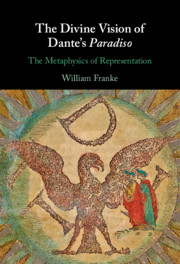Book contents
- The Divine Vision of Dante’s Paradiso
- The Divine Vision of Dante’s Paradiso
- Copyright page
- Contents
- Figures
- Prologue
- Acknowledgments
- Note on Translations and Primary Source Editions
- Part I The Literary Vision
- Part II Philosophical Reflections
- Excursus I Writing and Visionary Immediacy: Mechanics and Mysticism of the Letter
- Excursus II Saussure and the Structuralist Idea of Language as a System of Differences
- Excursus III Temporalization and Transcendence of Time through Language
- Excursus IV Transcendental Reflection: Time Synthesis and the Role of the “I”
- Excursus V Unmanifest Wholeness of Sense: Language as Image of the Imageless
- Excursus VI Transcendentality of Language and the Language of the Other
- Appendix Paradiso XVIII. 70–136
- Index
Excursus IV - Transcendental Reflection: Time Synthesis and the Role of the “I”
from Part II - Philosophical Reflections
Published online by Cambridge University Press: 26 August 2021
- The Divine Vision of Dante’s Paradiso
- The Divine Vision of Dante’s Paradiso
- Copyright page
- Contents
- Figures
- Prologue
- Acknowledgments
- Note on Translations and Primary Source Editions
- Part I The Literary Vision
- Part II Philosophical Reflections
- Excursus I Writing and Visionary Immediacy: Mechanics and Mysticism of the Letter
- Excursus II Saussure and the Structuralist Idea of Language as a System of Differences
- Excursus III Temporalization and Transcendence of Time through Language
- Excursus IV Transcendental Reflection: Time Synthesis and the Role of the “I”
- Excursus V Unmanifest Wholeness of Sense: Language as Image of the Imageless
- Excursus VI Transcendentality of Language and the Language of the Other
- Appendix Paradiso XVIII. 70–136
- Index
Summary
Phenomenology of time-consciousness underwrites Dante’s entire experience of the letters appearing successively to him in the Heaven of Jupiter and forming a whole only in his mental synthesis of their event. Dante takes the “I” as organizing framework and originary principle of the poem. But this I and the poem itself are put forward as mediations of a higher being, that of God. The situation is thus fundamentally different from that in modern phenomenological tradition, where the “I” as mediation of otherness is centered in itself rather than in a divine Other. The self in the perspective of Dante’s poem is a structure serving to relate to God as the absolute Other rather than simply encompassing all possible reality within its own parameters. Whereas in modern philosophy from Descartes to Husserl, otherness has typically been comprehended as no more than a detour back to self and thus as an indirect mode of self-relation, we need to stand this insight on its head (or turn it inside out) in order to see things from Dante’s perspective. Not the I, but God, is the ground and principle in Dante’s theocentric world-view. The reality of the “I” is derivative: it consists of being “made in God’s image.”
Keywords
- Type
- Chapter
- Information
- The Divine Vision of Dante's ParadisoThe Metaphysics of Representation, pp. 227 - 243Publisher: Cambridge University PressPrint publication year: 2021



